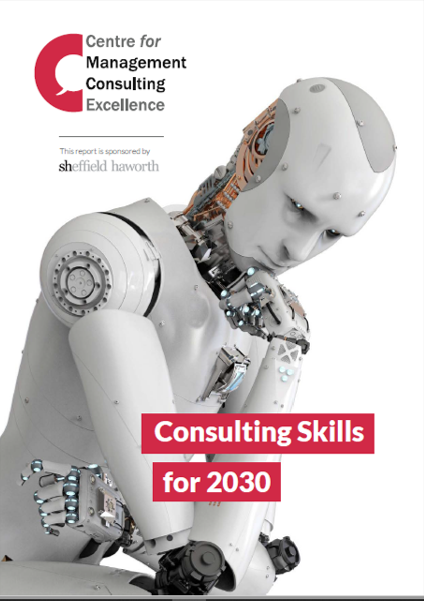
Together with Dr Mike Fenn, I was pleased to lead this important research project for the CMCE. The text below summarises the findings and recommendations.
A copy of the full report can be accessed free of charge through the following link: https://www.cmce.org.uk/projects
In 2018 the Centre for Management Consulting Excellence (CMCE), a pro-bono organisation established by the Worshipful Company of Management Consultants that
brings together management consultants, academics and other stakeholders in the management consulting community, conducted research into the skills that management consultants will need to sell and deliver assignments in 2030.
We sourced data from 157 respondents through face to face interviews and an online survey. The respondents comprised not only consultants and their clients, but a broad range of stakeholders. The consultants came from both large and small firms, and many have management experience in industry.
Respondents were asked to rank and comment on a number of technology and societal drivers of change, in terms of the scale of their likely impact on the skills needed by consultants. The survey then asked whether the traditional skills of a consultant (change management and the like) would still be relevant by 2030. We also gave space in the survey for respondents to provide unprompted insights.
Cyber Security (as a risk management skill) came out top in the impact rankings, with cyber risks being seen by respondents as a potential massive roadblock to a digital future beset by “unknown unknowns”. How to assess the risks, and how much of an organisation’s limited resources should be expended, in a context where assailants are out to destroy your business or steal your IP? While there will continue to be a technical battle between the good and bad guys, management consultants will be expected to drive board level discussions on steering their clients’ businesses through the cyber minefield.
In second place came AI (Artificial or Augmented Intelligence). There was a huge polarisation of views; some respondents see AI as huge disruptor, others see consultants taking it in their stride. Several respondents argue that the full impact will be felt by 2040 not 2030. New consulting skills will be in demand in framing questions, assessing how AI insights can be translated into human capabilities to deliver results, and advising on ethical implications and accountability.
In third place came the trend among consultants towards self-employment. Respondents agreed that concepts such as portfolio careers and work/life balances are here to stay, while also recognising that much of the new technology (AI engines, for example) will demand a level of investment that only big consultancies can afford. Will there be anti-trust legislation by 2030 if big firms act as AI monopolists? Respondents also commented about the pressures for independent consultants to both deliver and sell, with a new breed of agencies already offering to sell.
While coming out lower in the impact rankings, the other prompted themes – Big Data,
Globalisation, Internet of Things and Robotics all generated incisive comments.
Timeless consulting skills such as senior relationship building and change management will remain very important in 2030, as humans look to humans to contextualise and interpret the recommendations that technology will generate. This comes with two provisos – consultants must invest in understanding the new technologies if they are going to be able to interpret them, and they must beware the dangers of interpreting purely through the lens of past experience. The T-shaped consultants of 2030 (combining both deep specialist and broad generalist ability) must
also need resilience in order to thrive at an increased pace of change.
The most frequently mentioned “new skills” that consultants will need, according to our
respondents, are
New Technology | Cyber Security | Innovation | Self-promotion | Cultural adaptation | Empathy
There will be a change, and perhaps some reduction, in the opportunities for junior consultants to enter the market, with AI and Robotics taking over some of today’s entry-level consulting activity. Yet there will be new junior roles in scrubbing and keeping secure, at an industrial scale, the data that will feed the new technologies. We will also see an increased percentage of data scientists on many consulting assignments.
We asked our respondents: “All things considered, what change will there be in Consulting Skills needed in 2030 versus today?”
The overwhelming answer from our respondents is that the impact will be incremental, not radical. It suggests that adaptable consultants can march forward to 2030 in their stride. But the survey data rings an alarm bell for consultants when the results of consultants and non-consultants are compared. Non-consultants see the impact of cyber security, AI and self-employment on consultant’s skills as being much more radical by 2030 than do the consultants themselves.
There are some powerful implications here, which might lead to two alternative conclusions.
Consultants see the world through a filter of “we have seen changes before, we will overcome” and are better prepared than their clients give them credit for.
Or
Consultants are under-estimating challenges that are much more evident to the clients that they seek to serve, calling in to question whether they will have the knowledge and aptitude to be of use to clients in 2030.
Both are valid hypotheses, and of course for the management consulting profession the first one comes across more comfortably than the second.
Yet it could be disastrous to ignore the second conclusion.
Consultants must direct their inquisitiveness and knowledge building to get to grips with what is happening with new technologies and demographic trends, and to understand better the implications that these will have both for their clients and their clients’ customers. These are not all things that are fully known today, but that fact cannot be an excuse for any complacency. Clients need consultants to be thinking ahead of them, not lagging behind.
The CMCE wishes to thank all the people who gave their time to participate in the research, and the MBA students from Coventry University in London and Cass Business School for their invaluable support in collecting and analysing the data. The CMCE also appreciates the sponsorship provided by Sheffield Haworth for the publication of the report into our research.
